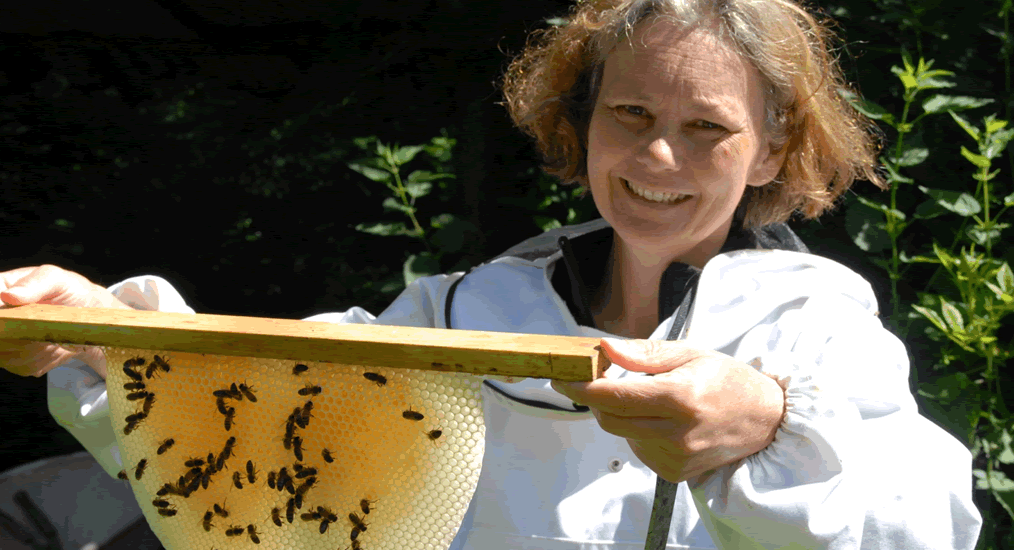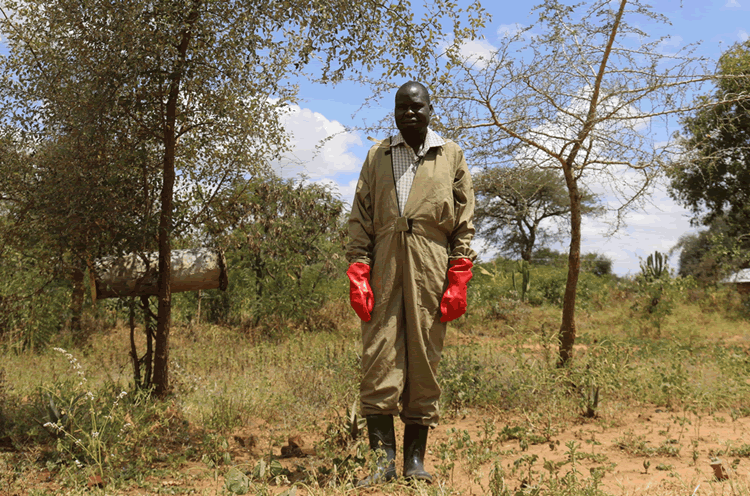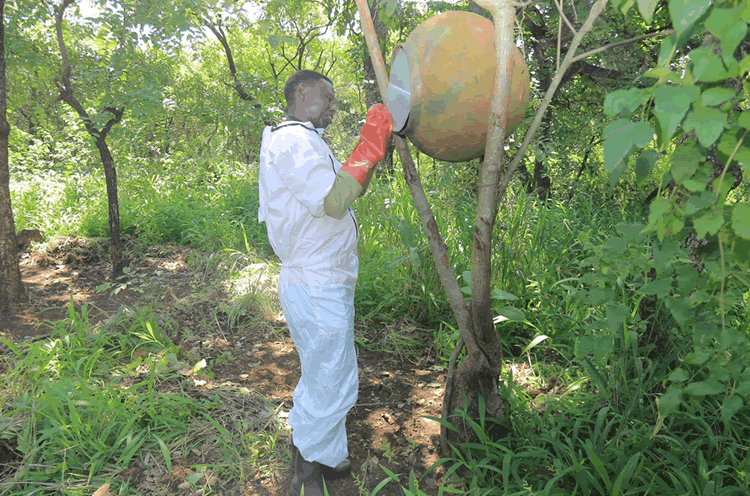- January 16, 2024
- Posted by: webmaster
- Category: News

Article by Janet Lowore, Bees for Development – UK
Nature Based Beekeeping is a practical approach to keeping bees that combines knowledge of bees in nature with local techniques and low-cost hives. It enables millions of farmers in rural communities to increase their quality of life. Nature Based Beekeeping is currently practiced in over 100 countries, and in Africa is the approach which delivers the highest volumes of honey.
So, what is Nature Based Beekeeping? In short it is any approach to keeping bees sustainably that uses nature, rather than cash, to get started and expand. It is an excellent approach for ordinary people with limited financial means, because most rural people have access to nature and nature is free.
Uganda, like many other African nations, is blessed with a natural abundance of apicultural resources, namely, honey bees, nectar and pollen. To derive a sustainable harvest from these resources, beekeepers need beehives. And for people to harvest good volumes of honey, low-cost hives are best, because with affordable hives more people can keep more bees. All the evidence from honey producing regions in developing countries points to the fact that where beehives are cheapest, total honey harvests are highest. This is because with low-cost hives the barrier to becoming a beekeeper is removed and almost anyone can participate, as explained by a Joshua Ngorok, a beekeeper from Karamoja, “It is so beneficial in the way that it is accessed by everybody in the community. This approach doesn’t discriminate whether you are a child or an adult, as long as you are creative enough you can make it work for you”.

“It is so beneficial in the way that it is accessed by everybody in the community. This approach doesn’t discriminate whether you are a child or an adult, as long as you are creative enough you can make it work for you”
Joshua Ngorok
Over the years significant effort and money has been invested in Uganda in introducing so-called ‘modern’ beekeeping. This trend began in the 1960s and has continued to the present day. Sadly, there is very little evidence that this effort has made a substantial and lasting contribution to raising the welfare of ordinary farmers. Much of the problem lies with the promotion of technology, which looks good ‘on paper’ but in practice offers no real advantage. In fact, contrary to helping people, the emphasis on expensive technology has in effect make beekeeping accessible only to better-off people or those who are lucky enough to be given free donations. And even then, the results are disappointing. Expert beekeeper Patrick Ayebazibwe draws attention to the advantages of local-style hives,
“You can start beekeeping with zero cost, because you can pick hive-making materials from nature. Even if you can’t make your own, a local hive can cost just UGX 5,000 compared to UGX 200,000 for a so-called ‘modern’ hive. Not only that but it is easier to harvest honey from a local style hive”. For beekeeping to support people’s livelihoods it should be practical, achievable and accessible – regardless of a person’s financial status or access to donor funds. There are countless examples of conventional beehive donation projects which have failed to meet expectations. It is time to re-consider.
“You can start beekeeping with zero cost, because you can pick hive-making materials from nature. Even if you can’t make your own, a local hive can cost just UGX 5,000 compared to UGX 200,000 for a so-called ‘modern’ hive. Not only that but it is easier to harvest honey from a local style hive”.
Nature, not cash, is the key ingredient
The Nature Based Beekeeping approach places natural resources, skills and knowledge at the heart of successful beekeeping – not expensive hives. It requires a very good understanding of the local context. Beekeepers need skills in making beehives using natural materials and they need knowledge about the local beekeeping season, when bees swarm and when flowers produce nectar and pollen and the optimal time for harvesting honey.
At this point in the article the reader might be asking, is Nature Based Beekeeping anything new? The beekeeping skills are not new, indeed Ugandan beekeepers are accomplished Nature Based Beekeepers. The difference lies in perspective – it means taking a fresh look at something that we see every day. Every day we see people make their own hives using natural, free materials, but we have been led to think that just because people have been keeping bees this way for a long time it must be old-fashioned. Not so!
Taking a fresh perspective and looking at beekeeping anew we can begin to see that conventional beehive donation projects are old-fashioned, because they rely on the out-dated idea than people need imported technology to succeed. On the contrary Nature Based Beekeeping builds on local expertise and knowledge and empowers people to connect with their traditions and cultures. Nature Based Beekeeping offers these benefits;
- Affordable
- Wise use of natural resources
- Sustainable
- Accessible to almost anyone ‘who is creative enough’
- Non-discriminatory
- Profitable because income exceeds cash outlay
- Yields good honey harvests
- In tune with local bee behaviour and ecology
- Natural, and chemical-free
So yes, Nature Based Beekeeping is what most Ugandans have been doing all along. It is good beekeeping that works and uses nature as the key ingredient. In generating income Nature Based Beekeeping is essentially a cash transfer from nature to beekeepers’ pockets – with a little help from a little insect.

Evidence of the success of Nature Based Beekeeping
Across Africa the regions which harvest the largest volumes of honey are those where Nature Based Beekeeping is practised, for example, Tabora in Tanzania, the North-Western Province of Zambia and south west Ethiopia. The high volumes of honey harvested in these locations have given rise to honey export. In Uganda, large volumes of honey are harvested in West Nile and around Kisoro, by beekeepers who own many, low-cost hives. Achini Kamilus, for example, uses hives which he makes himself allowing him to keep 230 colonies of bees. Skills, knowledge and nature – the essential elements of Nature Based Beekeeping – allow him to earn good income from bees. Meanwhile Ethiopian beekeeper Anduamlak Asmare explains why he too prefers local style hives to frame hives, “with frame hives the scaling-up is not promising as it is capital intensive and it is not preferable for catching swarms”. Last year, using local hives placed in a natural setting, Anduamlak made in excess of USD 1000 from beekeeping.
“with frame hives the scaling-up is not promising as it is capital intensive and it is not preferable for catching swarms”.
Describing Nature Based Beekeeping
There is no fixed definition of Nature Based Beekeeping, instead the approach is recognised by a set of features as follows:
- Beekeepers can make or buy their own hives at low-cost
- Beekeepers are not dependent on donors for repeat handouts, they are quickly self-sufficient
- Non-project beneficiaries can copy others, if they so wish
- Beekeepers can scale-up provided the market demand is there, and they are not constrained by the ‘beehive barrier’
- Local expertise, skills and knowledge are just as important as formal training – sometimes more important
- Provided that there is a good market, beekeeping thrives after the end of donor support
- Nature Based Beekeeping is adapted to mobile tropical bees and temporarily empty hives are not a problem
- Nature is the key ingredient to success, not expensive hives.
Conclusion
In conclusion let’s return to the words of Patrick Ayebazibwe who explains, “Local hives have not been given a chance by promoters in Uganda, instead they all look to the other side at so-called ‘modern hives’ Yet local hives are affordable and easy to use and you can even harvest honey without using protection. The difference in yield between local hives and Langstroths is minimal, in fact even you can sometimes harvest more from local hives. And the quality of the honey is the same”. The only down-side with local style hives is that people have been led to believe that they are old-fashioned. This is the wrong way of thinking. It is time we re-evaluated what we know. Local hives, local skills and expert knowledge – and of course plenty of bees and flowers – are needed to make a good income from bees. Nature provides and we all have access to nature. Let us instead look at beekeeping from a new perspective and embrace Nature Based Beekeeping, an approach that places nature centre-stage.
“Local hives have not been given a chance by promoters in Uganda, instead they all look to the other side at so-called ‘modern hives’ Yet local hives are affordable and easy to use and you can even harvest honey without using protection. The difference in yield between local hives and Langstroths is minimal, in fact even you can sometimes harvest more from local hives. And the quality of the honey is the same”
Sources:
1. Patrick Ayebazibwe, Achini Kamilus and Joshua Ngorok were interviewed by TUNADO in 2021.
2. Anduamlak Asmare was interviewed by Bees for Development Ethiopia in 2021.

Glory be to Almighty God for this long awaited information. Currently visioned to APICULTURE and the threat is my neighbor s to the site. How do we mitigate such??
Dear Joseph, Kindly let us know how neighbours to your site are a threat for us to see how best we can help you. Thanks. always feel free to reach out to us at info@tunadobees.org for prompt responses.